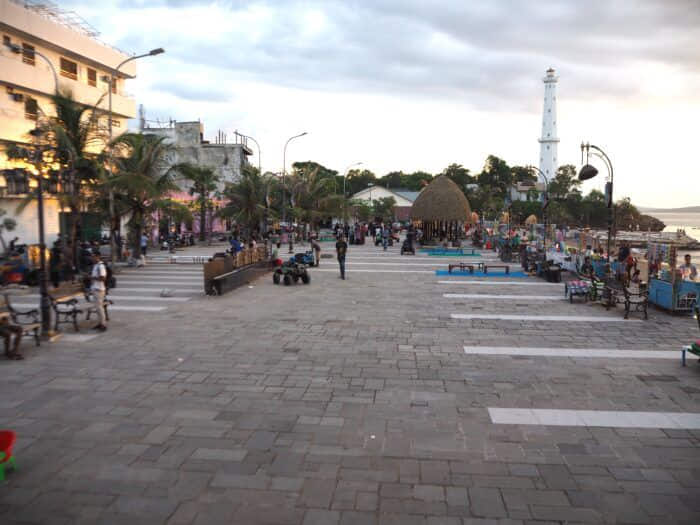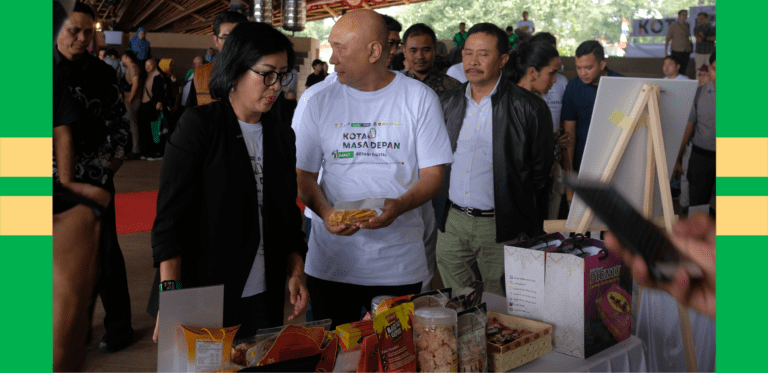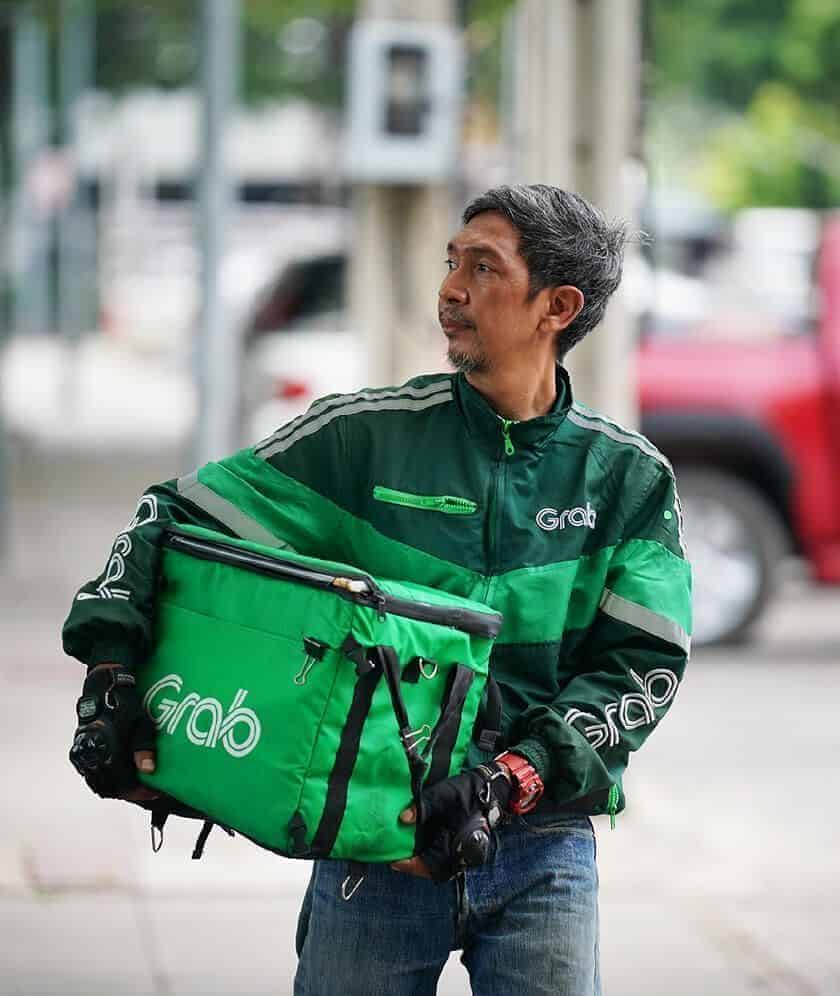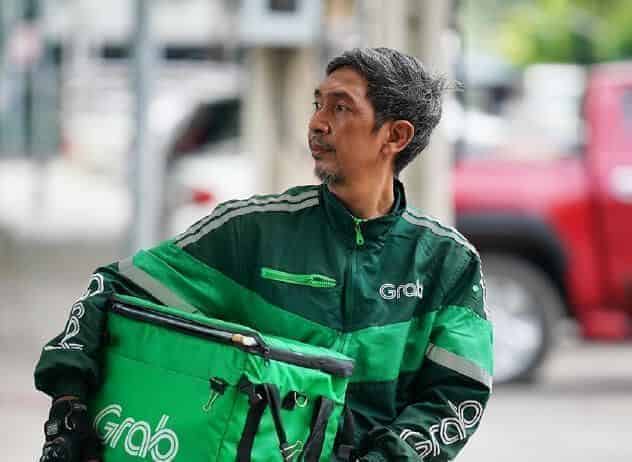The city of Kupang—with a population of under 500,000 inhabitants—is a far-flung destination. It’s located on the island of Timor in the Eastern part of Indonesia’s Nusantara island-chain, nearly 2,800 kilometres away from Jakarta, the country’s capital. Yet, it’s surprisingly vibrant.
“Kupang has a large student population. Young people from the entire Eastern Indonesia region come here to study. They are looking for affordable transportation, food options, and so on,” explains Halim Wijaya, Grab’s Director of East Indonesia. In a place like this, Grab’s on-demand transportation and delivery services fall on fertile ground.
Kupang is one of Grab’s Kota Masa Depan (Future Cities). The label describes up-and-coming second and third-tier towns across Indonesia, where an uptick of economic activity, and Grab’s presence, have gone hand-in-hand.

Like Kupang, many other cities far away from the Capital have undergone a spurt of activity with the advent of digitalisation.
Platforms like Grab had a small, but significant share in this development.
Grab’s presence not only allows millions of individuals to travel swiftly from one location to another, whether on a motorbike-taxi or a car, and have food, groceries, and household items delivered to them instantly. Grab has also been an escape from under-employment for many, enabling them to earn a livelihood as Grab drivers or delivery-partners. It’s a virtuous cycle, as greater public mobility encourages consumption, and thus, creates opportunities for micro, small, and medium enterprises (MSME) to cater to this demand. In some cases, businesses end up growing beyond the confines of their small town, taking full advantage of digital platforms to reach new markets.
Kupang, Garut: two of many success stories
“We believe that the future of Indonesia depends on these tier-two, tier-three cities,” says Halim. “In the big cities, technological literacy is already established. In the smaller cities, we can contribute to the education of people. How can they use technology to help themselves? This process is happening very fast.”
Garut, in the Western province of Java, Indonesia’s most populous island, is another success story for Grab.
The small city of less than 130,000 inhabitants is a gateway to nature for tourists arriving from larger cities who want to explore the hilly landscapes and culinary specialties of the area. This creates demand for reliable transportation options. Once there’s a density of driver-partners in one area, demand and opportunities for food- and minimart deliveries also rises, explains Halim.

The presence of Grab and other on-demand platforms tends to accelerate growth in towns that already have a kernel of activity.
That could be education, or tourism, like in the cases of Kupang and Garut. Or it could be the presence of factories, or nearby plantations or industrial sites. Such towns frequently receive visitors from larger cities who rely on Grab services for transportation and food delivery during their stays. This creates opportunities for entrepreneurs to rise to the challenge and meet the demand.
The second wave: Empowering local MSMEs
Grab’s Kota Masa Depan (KMD) programme is designed to support MSME in emerging towns like these.
KMD was born in 2021 during the pandemic, but has since continued to bolster the growth of MSMEs in second and third-tier cities across Indonesia.
Through this initiative, the company offers training and support to business owners, enabling them to effectively manage their business, and to make the most of the opportunities on the Grab platform.
The program has already benefited approximately 26,000 MSMEs in nine cities nationwide, including Kupang, Garut, and many others.
Grab closely works with local governments to make sure its initiatives are tailored to local needs. The training sessions and workshops provided aim to help MSMEs sustain and grow their businesses—not only within their local communities, but also beyond. They learn to explore opportunities to send their products to other cities and compete with bigger brands.
Cities light up
Grab’s presence in Indonesia’s smaller cities has been part of a visible wave of change.
Since the ride-hailing company first launched its services in Kupang back in 2017, there has been a measurable, two-fold increase in nighttime illumination, according to a 2021 report from the University of Indonesia Economy and Business School (LPEM FEB UI). This “lighting up” of the city after dark signifies an increase in its overall vibrancy and economic activity.
The study also found that 30% of the new merchants on GrabFood in Kupang between 2019 and 2021 were newly established businesses, meaning that the income opportunities presented by Grab encouraged entrepreneurs to start up.
(Read more: From farm to doorstep: Bringing farmers online in Vietnam)
MSMEs stand as the powerhouse of Indonesia’s economy, contributing a substantial 61% to the country’s gross domestic product (GDP) in 2023, according to Indonesia’s Minister of Finance, Sri Mulyani.
Recognizing the pivotal role of this business sector in driving economic growth, Grab takes proactive steps to support it, through programmes like KMD.
“MSMEs keep on running, even during economic downturns and crises. Yet, they lack access to technology and global markets,” says Halim.
There’s still homework to be done when it comes to ensuring affordability and accessibility in small town and rural areas. Purchasing power remains lower than in top-tier cities, and advanced technology is considered expensive.
“While big cities are already grappling with the complexities of products and AI, residents in second- and third-tier cities are still considering phone storage space before downloading an app, as many of them use low-end phones,” Halim says.
That’s why Grab is developing its app towards becoming ever more inclusive and efficient, ensuring the platform can serve and empower people in smaller cities effectively.
3 Media Close,
Singapore 138498
Komsan Chiyadis
GrabFood delivery-partner, Thailand
COVID-19 has dealt an unprecedented blow to the tourism industry, affecting the livelihoods of millions of workers. One of them was Komsan, an assistant chef in a luxury hotel based in the Srinakarin area.
As the number of tourists at the hotel plunged, he decided to sign up as a GrabFood delivery-partner to earn an alternative income. Soon after, the hotel ceased operations.
Komsan has viewed this change through an optimistic lens, calling it the perfect opportunity for him to embark on a fresh journey after his previous job. Aside from GrabFood deliveries, he now also picks up GrabExpress jobs. It can get tiring, having to shuttle between different locations, but Komsan finds it exciting. And mostly, he’s glad to get his income back on track.

